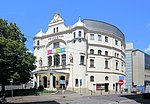Vienna General Hospital
1697 establishments in the Habsburg monarchy17th-century establishments in AustriaBuildings and structures completed in 1697Buildings and structures in AlsergrundBuildings and structures in Vienna ... and 6 more
Hospital buildings completed in 1994Hospitals established in the 17th centuryHospitals in AustriaInfrastructure completed in 1784Infrastructure completed in 1903Synagogues in Austria

The Vienna General Hospital (German: Allgemeines Krankenhaus der Stadt Wien), usually abbreviated to AKH, is the general hospital of the city of Vienna, Austria. It is also the city's university hospital, and the site of the Medical University of Vienna. It is Europe's fifth largest hospital, both by number of employees and bed capacity.
Excerpt from the Wikipedia article Vienna General Hospital (License: CC BY-SA 3.0, Authors, Images).Vienna General Hospital
Währinger Gürtel, Vienna KG Währing (Währing)
Geographical coordinates (GPS) Address Phone number Website External links Nearby Places Show on map
Geographical coordinates (GPS)
| Latitude | Longitude |
|---|---|
| N 48.22 ° | E 16.3475 ° |
Address
Allgemeines Krankenhaus Wien
Währinger Gürtel 18-20
1090 Vienna, KG Währing (Währing)
Austria
Open on Google Maps







